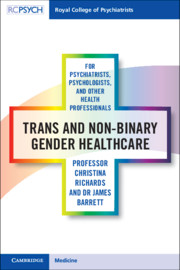Book contents
- Trans and Non-binary Gender Healthcare for Psychiatrists, Psychologists, and Other Health Professionals
- Reviews
- Trans and Non-binary Gender Healthcare for Psychiatrists, Psychologists, and Other Health Professionals
- Copyright page
- Contents
- Acknowledgements
- Author Biographies
- Chapter 1 Introduction to Gender Diversity
- Chapter 2 Assessment
- Chapter 3 Physical Treatments for Trans People and Their Interactions with Psychiatric Treatments
- Chapter 4 Mental Health Conditions
- Chapter 5 Supporting Trans and Non-binary People in Mental Health Services
- Chapter 6 Supporting Trans and Non-binary People in Forensic Settings
- Chapter 7 Autistic Spectrum Conditions and Intellectual Disability
- Chapter 8 Sexuality, Relationships, and Reproduction
- Chapter 9 Legal and Religious Aspects
- Chapter 10 Psychotherapy
- Index
- References
Chapter 9 - Legal and Religious Aspects
Published online by Cambridge University Press: 18 August 2020
- Trans and Non-binary Gender Healthcare for Psychiatrists, Psychologists, and Other Health Professionals
- Reviews
- Trans and Non-binary Gender Healthcare for Psychiatrists, Psychologists, and Other Health Professionals
- Copyright page
- Contents
- Acknowledgements
- Author Biographies
- Chapter 1 Introduction to Gender Diversity
- Chapter 2 Assessment
- Chapter 3 Physical Treatments for Trans People and Their Interactions with Psychiatric Treatments
- Chapter 4 Mental Health Conditions
- Chapter 5 Supporting Trans and Non-binary People in Mental Health Services
- Chapter 6 Supporting Trans and Non-binary People in Forensic Settings
- Chapter 7 Autistic Spectrum Conditions and Intellectual Disability
- Chapter 8 Sexuality, Relationships, and Reproduction
- Chapter 9 Legal and Religious Aspects
- Chapter 10 Psychotherapy
- Index
- References
Summary
The legal aspects of a change of social gender role are important, if for no other reason than the law matters a lot. Sadly in some countries, there is no possibility of a change of legal gender; indeed, there can be appalling prohibitions against it. In others, there is a very limited and onerous set of options. Consequently this chapter will focus upon the UK legal system, as a discussion of all of the varied global legislation associated with gender would be a book in its own right, although interested readers may wish to read the excellent work of the International Lesbian Gay Bisexual, Trans and Intersex Association (ILGA.org) for further detail on this.
- Type
- Chapter
- Information
- Trans and Non-binary Gender Healthcare for Psychiatrists, Psychologists, and Other Health Professionals , pp. 91 - 105Publisher: Cambridge University PressPrint publication year: 2020



